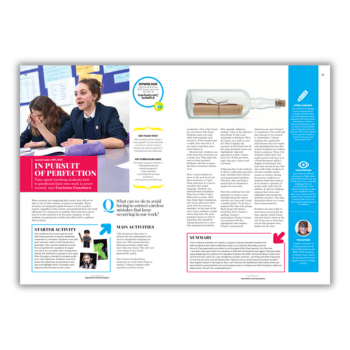Learning a new language – Unlocking more than just economic potential

Learning a new language does more than simply fuel economic growth – let’s dive into its impact on cognitive processes…

- by Teachwire
- Classroom expertise and free resources for teachers

We examine how learning a new language can enhance decision-making abilities and more. We also uncover the expansive benefits of learning another language, beyond its economic contributions…
Could learning a new language improve your decision-making?

Hannah Day looks at why learning another language isn’t just good for practical reasons, but could make you think more rationally too…
Since the study of languages at GCSE became optional in 2004, entries have seen a steady decline.
Yet with new research showing how the benefits of a acquiring a second tongue can reach into unexpected areas, perhaps now is the time for schools to make studying MFL a more compelling choice.
What follows are several areas of research which seem to suggest that the comparative lack of familiarity with a language not learnt at birth allows for lower levels of emotional attachment and more reasoned assessment of situations as a result.
Needless to say, the ability to reflect calmly and with clarity across a range of subjects and situations has to be a benefit to all of our students – whatever they go on to become.
Improve your moral reasoning
You’re standing on a footbridge. Below are a group of people walking along a train track. You see a train and realise it will hit them, causing loss of life. The only way to stop it is to push a large man off the footbridge, in front of the train. That way, only one person dies, rather than the group. What do you do?
If presented with the above scenario in your native tongue, chances are you’ll do nothing. When tackling the same quandary in their second language, as many as 50% more chose to take one person’s life to save the others.
The thought of killing someone, even if it’s to save many others, is simply too upsetting for many to fathom – but when weighing up the same considerations in another language, we’re able to distance ourselves more from the related emotions and thus make the more logical choice.
Research: The Foreign-Language Effect
Match with: Philosophy and ethics
Career pathway: Politics, policy, charity sector, law, medicine, journalism, teaching, social work and community work
Make better investments
People hate to lose, and never more so than when it comes to money. Let’s say I offer to give you £1 – or alternatively, you let me have that £1, in return for a 50% chance to win £2.50. What would you do?
If I asked you in your native language, you’d be more likely to take the £1 and run. This is known as myopic loss aversion. Yet researchers have found that if I were to present the same offer in a second language, you’d be more likely to take the risk in return for a possible higher reward.
Further research suggests that using a second language makes it easier for people to abandon failing endeavours and walk away from losses before they grow bigger. By observing information through the frame of a language not embedded in us since birth, it would seem we allow our emotions more space, guiding us towards more logical and rational behaviours.
Yes, it hurts to accept a loss – but it’s better to walk away before the consequences grow yet more dire.
Research: Foreign language attenuates the sunk cost effect
Match with: Economics and politics
Career pathway: Business, investments, banking, government, policy development, consultancy, law
Process difficult memories
When talking in our first language, we understand and recognise the strengths and nuances of the words we use. Can you remember, as a child, hearing a swear word for the first time? Or being caught uttering one? Chances are, that moment has left an emotional residue.
Words in a language we learn later in life don’t carry quite the same sting or emotional weight. This can allow us to recall difficult experiences without the same levels of emotional distress.
Nor is it just emotions that can distort our recall of past events. Our own memories can trick us, implant false memories and confuse our recollections. Yet it seems that when we recall events using a second language, we tend to be more careful and deliberate with our thinking.
While navigating the correct meaning of words we might not be entirely familiar with, we’ll be similarly careful to organize our memories too.
Research: Foreign language reduces false memories by increasing memory monitoring.
Match with: Psychology
Career pathways: Counsellor, business, management, teaching, research, social work, careers in medicine and healthcare
Hannah Day is head of art, media and film at Ludlow College.
Why learning a language does far more than ‘just’ helping the economy
The government wants more MFL students to boost the economy, observes Dr Shirley Lawes – but setting such goals sells the subject short…
The UCL Institute of Education was recently appointed to lead the National Consortium for Languages Education (NCLE). This is a new national initiative funded by the DfE that’s set to run over the next three years.
It’s aim is to increase the uptake of language qualifications at KS4/5.
One might be inclined to think that this move comes not a moment too soon. After all, the proportion of young people taking languages at GCSE and A Level is declining at an alarming rate.
This latest attempt at regenerating language learning in English schools follows a number of prior initiatives that set out to improve the quality and participation rates of MFL provision in schools – not least the Modern Foreign Languages Pedagogy Review. Also included are the significant revisions we’ve seen to GCSE and A Level exams.
“The proportion of young people taking languages at GCSE and A Level is declining at an alarming rate”
Daunting task
The new NCLE will have a daunting task ahead. Though it does at least seem equipped with the knowledge, expertise and experience it’ll need to perform its role of leading 25 ‘hub’ schools across the country.
These will in turn link with groups of local schools. They will provide inspiration and training for teachers around regenerating their languages curriculum and pedagogical approaches.
The government’s agenda here is quite clear. As Nick Gibb, the Minister for School Standards, declared:
“Our economy needs people who can communicate across the globe and trade with overseas businesses. This programme is about ensuring we have the next generation of young people with the languages needed to compete on the world stage.”
Trending
The NCLE will find itself needing to address the implications of that professed objective, however. Because as anyone who has ever used multiple languages in a professional context knows, the level of knowledge and fluency attained at GCSE or even A Level won’t be enough to enable anyone to ‘Communicate across the globe and trade with overseas businesses’.
This instrumental view of MFL learning seems to be increasingly widespread and ought to be challenged. A narrow focus on improving exam results or the promise of better job prospects won’t be enough to make MFL learning more attractive to young people.
Moreover, justifying foreign language learning in terms of what the economy needs is to ignore the essential educational value of foreign language learning to individuals.
How learning a new language boosts creativity
The act of studying a foreign language takes learners on a voyage of discovery. They’re invited to compare the familiar with the unknown in terms of communication and culture.
This process challenges parochialism, and invites us to openly question ourselves and others.
“The act of studying a foreign language takes learners on a voyage of discovery”
MFL is a subject discipline in which discussions of language and culture can seamlessly interweave and upend received ideas and prejudices.
MFL teachers can, in a very special way, broaden young peoples’ cultural horizons. They can also expand students’ knowledge of the best humankind has achieved beyond our parochial borders. This is regardless of whether or not they go on to become linguists or use a foreign language professionally.
This is what teachers ought to value, over and above more instrumental pressures, if they want to develop their skills and become more confident at what they do.
The route to successful language learning ultimately comes down to teachers applying their imagination and creativity appropriately. My own work with MFL teachers in recent years has confirmed for me that there’s a sincere desire across the profession to re-evaluate priorities.
Teachers want to develop better practice in relation to the changing aims and purposes of the MFL curriculum and the place of languages within education more broadly.
Already, there are aspirations on the part of teachers to create a rich language learning experience that extends to all pupils. There’s also a collective desire to explore beyond the boundaries of prescribed content and exam specifications. Yet they’ve had few opportunities to even attempt developing their ideas in the classroom.
Outcomes-driven
In many schools and trusts, the scope MFL teachers have to work collaboratively, experiment and innovate has been greatly diminished. At the same time, a narrow focus on exam results has risen to become the dominant preoccupation for MFL practitioners.
We can see this in how ITT courses now feature far less emphasis on language learning pedagogy via practical experiences in the classroom. An apprenticeship model of learning to teach has also resulted in the exclusion of certain theoretical knowledge around how languages are learned effectively.
“ITT courses now feature far less emphasis on language learning pedagogy via practical experiences in the classroom”
It’s important to recognise that MFL teaching and learning doesn’t fit comfortably into an ‘outcomes’-driven curriculum. This is one where short-term goals and superficial ‘evidence-gathering’ prevails, and where assessment shapes pedagogy.
Cultural content
That said, the NCLE initiative will undoubtedly have a strong focus on teacher development. It will seek to build teachers’ confidence around working both collaboratively and autonomously. We can hopefully expect to see teachers being encouraged to try out a range of different teaching approaches. They may even experiment to a degree with subject content.
It’s no secret that KS4 learners often find course content boring. That’s partly down to the aforementioned narrow focus on GCSE preparation. But could KS3 curriculum content that’s been built around the same topics for years and consistently failed to enthuse learners also be part of the problem?
If the end goal is to raise standards and attainment at GCSE, we can’t ignore the wider context of both primary and KS3 learning.
Any attempt at ‘reviving’ the role of MFL in the school curriculum must take account of the crucial relationship between language and culture. It must also consider what and how cultural content can be better represented. Without this, foreign language learning becomes a sterile activity.
“We can’t ignore the wider context of both primary and KS3 learning”
Enhancing motivation
Some years ago I became involved in a KS3 curriculum development project with the British Film Institute. This encouraged the use of short foreign language films for teaching purposes in MFL classrooms.
The Screening Languages project built on a decade’s work with student teachers on a PGCE Course at the UCL Institute of Education. The idea was to introduce learners to an accessible form of culture that would stimulate their interest and engagement. At the same time it aimed to increase their attainment and confidence in speaking and writing.
Around 800 learners and some 27 teachers from 19 schools took part in the project over a span of two years. And the results were very positive.
Teaching with short film is just one example of the kind of culturally-based language learning resources we can use to enrich the languages curriculum and enhance students’ motivation.
If we can persuade teachers to work together and break out of the tired, often unsuccessful content and practices that have been the norm for so long, the end result is likely to be a more dynamic and challenging form of MFL teaching. One that makes it clear that there are no ‘quick fixes’.
Learning a new language is a long game
MFL learning is a ‘long game’. Reducing it, as a subject discipline, to simply the acquisition of ‘language skills’, undermines its status within the school curriculum. So too does the creeping tendency to justify foreign language learning instrumentally, in terms of what the economy requires. This is rather than presenting it as a rich educational experience in its own right.
The injection of financial and professional support that will accompany the new NCLE marks a golden opportunity to work with teachers in objectively re-evaluating what foreign languages are taught in schools and how.
Above all, it presents us with the chance to finally build a strong framework for professional development, pedagogical practice and successful MFL learning.
Dr Shirley Lawes is a lecturer in modern foreign languages at UCL Institute of Education. Browse our resources for European Day Of Languages.










